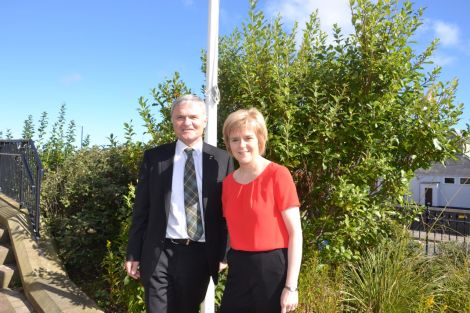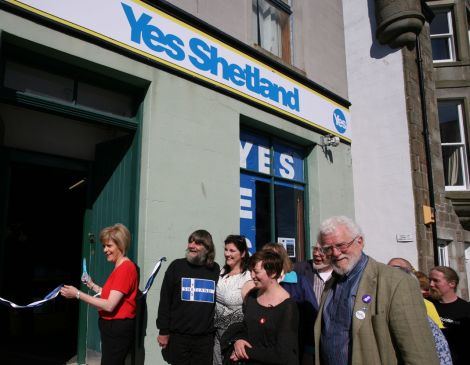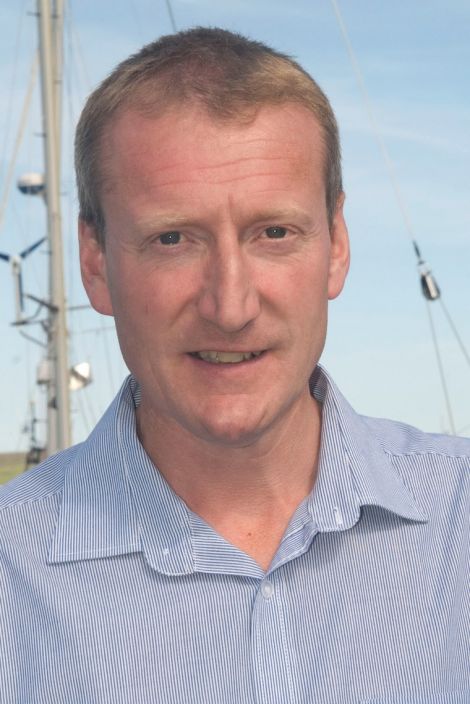Scottish Independence Debate / Sturgeon: isles oil fund sets template for Scotland
AN INDEPENDENT Scotland should follow Shetland’s example and create an oil fund to benefit future generations, Nicola Sturgeon has said during a visit to the islands.
The deputy first minister arrived in Shetland off the north boat on Wednesday morning to carry out a series of speaking engagements. Her visit comes just over three weeks before the 18 September referendum.
Sturgeon described the Labour and Tory governments’ failure to create an oil fund in the 1970s and 1980s – something Shetland’s politicians had the foresight to do – as a “mistake of monumental proportions”.
Coinciding with her visit, isles MSP Tavish Scott has announced that this autumn he will seek to enshrine many of the powers the SNP is offering to Scotland’s islands in law should there be a No vote.
In response, Sturgeon said that “where we can do things without a Yes vote, we are keen to work and do them – we are very committed to the idea that decisions lie as close to the people who are affected by them as possible”.
But she pointed out that the commitment to devolve seabed revenue directly to the islands would only be possible with a Yes vote. Sturgeon said it would mean “a new opportunity for Shetland communities to benefit from the industry off their shores”.
“Shetland is on the cusp of a second oil boom,” she said. “Anyone who comes here can’t miss the hundreds of workers coming on and off the islands and the impact all of this activity has on small island communities.”
She described Shetland’s high quality public services – largely thanks to the oil fund created in 1976 – as “a good example” of what could be achieved nationally by using oil revenue more astutely.
Become a member of Shetland News
“The UK is, I think, one of only two oil-producing countries in the world that didn’t take the decision so that future generations get the chance to benefit from our incredible good fortune in having oil and gas reserves,” she told Shetland News.
“I think the other country is Iraq, which doesn’t necessarily put us in the best company.”
Recent weeks have seen the Yes and No campaigns squabble over conflicting estimates of how many billion barrels of oil are left in Scottish waters.
Irrespective of those numbers, many analysts expect that oil revenue will be required to balance the Holyrood budget in the coming years.
However Sturgeon insisted the SNP would look to belatedly create a national energy fund after independence.
“Unfortunately you can’t turn the clock back, but we can absolutely decide that we’re not going to make the same mistake in future,” she said.
While she did not offer credence to Yes Shetland’s claim that David Cameron’s visit last month related to a major new oil find, Sturgeon said the UK state had “very deliberately underplayed Scotland’s oil wealth” for 40 years “so I’m not naïve enough to think Westminster governments are not capable of doing that now and in the future”.
“It should really anger people in Scotland to look at… the oil fund Norway has got. They don’t call it their national pension fund for no reason.
“Are we going to decide that we want to catch up with that over the next 30-40 years, or are we going to continue down the path that we’re on and end up as one of the only oil-producing countries in the world that doesn’t have something to show future generations?
“I think that would be an absolutely disastrous mistake to make.”
Scott and others in the islands have criticised the SNP for being a “centralising” government and clawing too many powers back to Edinburgh since 2007.
The move towards a single police force, in particular, is often singled out. Sturgeon insisted that was ‘not about eroding community policing”, and the resulting savings had allowed for more police officers to be maintained.
“Tavish was against that proposal, which he’s entitled to be,” she said. “The single police force was established because we were in a situation where we were facing very severe budget cuts. Therefore the drive… was to ensure as little money as possible was spent in backroom services and as much money as possible was spent on frontline policing.”
Another bone of contention has been the manner in which Serco was awarded the lucrative £240 million North Boats contract in 2012. SIC politicians spoke of being brought down to Edinburgh and “stuck in a cupboard” when the contract was being drawn up.
Sturgeon said that if islanders felt that way then that was “a message I’ve got to hear and take back and make sure we respond to”.
While she understands that for some islanders “Edinburgh doesn’t seem much closer than London”, the devolved Holyrood government is “a lot more accessible” for local authorities.
There is also frustration that, while the western isles is benefiting from cheaper ferry fares thanks to the “road equivalent tariff”, a model to bring the price of travel down for passengers in Shetland has yet to follow.
Sturgeon said the SNP was “keen to work with islanders, with ferry providers, to make sure that over time we are able to tackle some of these issues”.
Turning to this morning’s announcement from Scott and his Orkney colleague Liam McArthur about ensuring more powers for the islands after a No vote, Sturgeon said the SNP was “very committed” to delivering its proposals whatever the outcome on 18 September.
“I just think we’ll be in a better position to do that in a more meaningful way if we have a yes vote rather than a no vote,” she said.
“I’m kinda slightly puzzled as to why neither Tavish nor Liam, in all the years we’ve been in parliament, have mentioned the idea of this or brought forward legislative proposals of their own.
“It’s taken to the day I’m coming to Shetland for them to think this is a good idea.”
Scott responded by saying Sturgeon’s independence promises showed the nationalists “just don’t get it”.
“Islanders don’t want more powers administered by a central belt, distant government,” he said. “They want control over their own resources.
“The nationalists’ plans simply move power from London to Edinburgh. Liberal Democrats want home rule all round.
“Islanders will be wary of centralising nationalists bearing gifts. Given that the SNP’s power promises are conditional on a vote for their independence plans, Nicola Sturgeon’s whistlestop tour from Edinburgh is a gun to the head – vote for us or else you get nothing.
“Islanders are not taken in and that is why Shetland will vote ‘No Thanks’ in three weeks’ time.”
Sturgeon said her initial impression was that there is “very clear” evidence of a grassroots movement favouring Scottish independence within the islands – pointing to active branches of Women for Independence and the National Collective movement.
One of the real hallmarks of the Yes campaign is that it is grassroots-driven,” she said. “The Yes campaign is not about the SNP. A yes vote is about taking control of our own future into our own hands.”
While her party has been unable to gain traction in Shetland – a Liberal stronghold for over half a century – to match its electoral gains elsewhere, Sturgeon said the referendum was “not a party political vote” and she believed many Liberal voters would reject the union.
With the isles in the midst of an economic boom and enjoying steadily low unemployment, a thriving construction industry and local hotels fully booked months in advance, why should islanders take the risk of voting yes?
“I was talking to some local folk earlier on who were talking about the years of failure of Westminster governments to deliver for Shetland in terms of more autonomy and power,” Sturgeon said.
“I would say: why stick with a system that hasn’t really been in your best interests? I know some people feel nervous and scared about the prospect of independence, but sometimes you have to grasp the opportunity of doing things differently and better.
“It’s about how we empower everybody in Scotland to contribute to making this a better country to live in, and I think that’s as relevant to Shetland as it is to my constituents in the south side of Glasgow.”
At the Althing independence debate in Tingwall earlier this year, Northern Isles MP Alistair Carmichael said the SNP had failed to demonstrate how it would pay for Scandinavian-style social provision.
Sturgeon insisted that taxes would not need to rise to fund new policies such as expanding childcare.
“We are haemorrhaging a lot of our tax revenue on things like Trident nuclear weapons that we don’t need, supporting folk sitting in the House of Lords – just two examples.
“One of the things often missed in this whole debate is that Scotland’s not subsidised right now – everything we enjoy, take for granted, we pay for out of our taxes. It’s just that right now we send it to London and it decides how much of it should be sent back.
“The beauty of a policy like childcare is that as you transform and expand childcare, you enable more parents to go back to work, particularly women.
“Then these people pay taxes, national insurance, buy more, pay more in VAT. You raise and increase revenues coming back to government – that’s what makes a policy like that financially sustainable.”
She also denied that plans in the government’s white paper to reduce corporation tax jarred with the SNP’s claim to be a party of social democrats.
Sturgeon said that in order to foster “greater social justice and greater equality” it was necessary to have “a strong economy that’s earning and generating the wealth to pay for it”. Cutting corporation tax, she added, would create more growth and jobs.
- Tomorrow Shetland News will hear from Scottish Secretary and Northern Isles MP Alistair Carmichael on why he believes a Yes vote would be bad news for the islands.
Become a member of Shetland News
Shetland News is asking its many readers to consider paying for membership to get additional features and services: -
- Remove non-local ads;
- Bookmark posts to read later;
- Exclusive curated weekly newsletter;
- Hide membership messages;
- Comments open for discussion.
If you appreciate what we do and feel strongly about impartial local journalism, then please become a member of Shetland News by either making a single payment, or setting up a monthly, quarterly or yearly subscription.
























































